Lionel Maurel, librarian and lawyer in France, works at the French National Centre for Scientific Research (CNRS) on open science. For many years, he has been defending the interests of libraries on his blog S.I.LEX by offering legal analysis to librarians concerning e-lending, copyright reforms and the public domain. This article presents his reflections from the Racine report on the impacts of the current copyright system on the rights of artists and creators and the link with libraries. (French version below)
Here are the Racine Report recommendations. The 23 recommendations translated in English.
Could you explain to us what the Racine report is and the context of its production?
This is a report submitted to the Ministry of Culture in January 2020. Entitled “The author and the act of creation“, it was prepared by Bruno Racine, adviser at the Court of Accounts, who directed the National Library of France from 2007 to 2016. It contains 23 recommendations aimed at improving the situation of authors and creators (henceforce ‘artists-authors’) by adapting the regulatory framework to the new realities of the creative professions.
The origin of this report is to be found in the strong mobilization of authors in France, which has lasted for several years, in reaction to a continuous deterioration of their living conditions. In 2017, a tax reform took place, which further weakened a large share of authors who were already fighting against insecurity. To cope, artist-authors have chosen to act by relying on unions, which is fairly new in France. Traditionally, the interests of authors are in fact rather represented by collecting societies.
The Racine report commission intervened to try to resolve an increasingly explosive situation, with calls from professional writers to boycott large bookfairs to draw attention to their situation. Drawn up after extensive consultation, the Racine report was eagerly awaited and it paints a grim picture of the situation of authors in France. In certain sectors such as comics and graphic novels, despite its economic growth, almost a third of authors live below the poverty line and the rate rises to 50% for women. France is often presented as “the country of copyright”, but this reputation hides a deep crisis situation for creators.
What analysis can be made of the recommendations in this report?
The greatest contribution of this report is to show that the authors’ livelihood does not depend solely on copyright, but on a much more complex institutional arrangement, where questions of taxation and social protection play a decisive role. It also shows that artist-authors do not have a real professional status, as if their activity did not constitute a profession in their own right. To remedy this shortcoming, the Racine report proposes to create such a statute, in particular to facilitate access by authors to the benefit of social rights (health insurance, training, retirement, etc.).
Furthermore, the Racine report defends the idea that artist-authors should not depend solely on the exploitation of their works by the cultural industries, but also be paid directly for their work. He proposes for this the establishment of an “order contract” which would oblige intermediaries, such as publishers or producers, to pay for the creative work in addition to the payment of copyright royalties.
This would be a profound change in France, as since the time of Beaumarchais and the French Revolution, the law considers the author as an owner deriving his income from the exploitation of his work. This system certainly allows the author theoretically to benefit from remuneration, but we have arrived today at the paradox that the work is better protected than the author, and it is the former that constitutes the true centre of gravity of intellectual property.
Samantha Bailly, an author particularly involved in the unions of artist-authors who mobilized around the Racine report, thus sums up that the change of perspective that this text proposes to operate: “the improvement of our social rights is linked to the recognition of artist-authors both as owners of works, but also as workers. We are many individuals, not just works – we have bodies, we eat, we hurt, we get sick, etc. It is this paradigm shift proposed by Bruno Racine’s report. “
Another essential point concerns the mechanisms of author representation. The report highlights many dysfunctions in the way the interests of artist-authors are defended. Generally, collecting societies are heard a lot in public debates around creation, especially when copyright is concerned. But the report shows that these companies and the authors do not have quite the same interests and it requests that part of the sums collected by the former be used to finance the unions of authors. He also calls for these unions to be more widely involved in the definition of cultural policies, in particular through the various commissions set up by the Ministry of Culture. These proposals were very badly received by the collecting societies which vigorously opposed them, which tends to show that the Racine report is rather right to underline a divergence of interests!
Copyright discussions would likely be different if creators could make their voices heard more directly. In 2018, a case took place in France which proved to be very instructive. A publishing rights firm tried to charge for public library readings, including story times for children. This sparked strong opposition from librarians, but also from some of the authors themselves who, through unions, have indicated that they want these library uses to remain free. Thanks to this direct intervention of the authors in the debate, the publishers’ project was abandoned.
What are the main challenges of this report for libraries?
At first glance, this report seems quite distant from the activity of libraries, but they should pay close attention to it, because its recommendations could profoundly change the landscape of creation.
For more than 20 years, libraries have been mobilized to change copyright regulations, in particular by recognizing new exceptions adapted to the internet and digital uses. Whether global or international, these debates are very difficult and progress remains slow, as libraries face opposition, led mostly by collecting societies or government officials, who argue that these exceptions would threaten authors in their ability to live from creation.
However, the Racine report very clearly demonstrates that the real problems of the authors lie elsewhere: they mainly reside in the imbalance of the balance of power with intermediaries such as publishers or producers, which leads to an inequitable distribution of value within cultural sectors. The precariousness of the authors also stems from the fact that their work is not well recognized, and therefore not well remunerated, because it is “invisible” in a way by the intellectual property on which the laws focus.
At no time did the Racine report point to the issue of pirating works on the internet as the cause of the impoverishment of authors, nor did it indicate that exceptions to copyright would weaken their situation. On the other hand, he criticizes the functioning of collecting societies, for example pointing to the excessive salaries of their managers or the fact that they redistribute the money collected to too few authors.
These findings are of direct interest to libraries, as they open the way for further discussions on systemic reform. It is significant that none of the points discussed in the Racine report were really discussed during the drafting of the new copyright directive adopted in 2019 by the European Parliament. The debates once again focused on strengthening intellectual property and criticizing new exceptions to copyright. But it is not this text that will rebalance the relations between the authors and the intermediaries, as requested by the Racine report …
There is one point in the report which illustrates very well the false questions into which copyright disputes often fall. In France, the idea of establishing a “paid-for public domain” regularly returns to public debate, the goal being to create a sort of tax on the commercial uses of works belonging to the public domain. The public domain is a mechanism that primarily benefits libraries and their users, in particular through the digitization of heritage collections. However, the Racine report unequivocally dismisses this idea of the paying public domain, by showing that it would yield very little to the authors while restricting the uses and dissemination of culture. On the other hand, the report points to the fact that too small a share of aid for creation paid by the Ministry of Culture or collecting societies directly benefits artist-authors. This is just one example among many showing how false debates often hide the real questions …
What are the first steps for libraries to support these principles nationally and internationally?
It is quite striking that libraries are absent from the Racine report, even though they also constitute a source of income for authors. Through the acquisition of media, subscriptions to digital resources, but also with the sums paid under the lending right, the libraries contribute to the remuneration of creators. In France, there is even a direct link between lending in the library and the social rights of authors, because part of the sums paid by libraries under the lending right is used to finance the retirement of writers.
It is a pity – but also very significant – that the Racine report did not take this link into account, because it reveals a certain form of invisibility of libraries in the creation economy. Too often, libraries are accused of weakening the culture market by “cannibalizing sales”, when no serious economic study has ever demonstrated such a phenomenon. On the contrary, libraries could contribute more widely to the funding of creation if they were better integrated into the remuneration systems. For example, eBooks are a growing part of the work of libraries, but on legally fragile bases, since the legislation on the lending of the paper book does not apply and the system had to be reorganized around contractual negotiations with the publishers. As a result, the supply for libraries remains incomplete, but above all, the legal system of lending rights is put aside, which does not help to finance the social rights of authors …
One could imagine an overhaul of the system, so that libraries can more easily make content available to their users, as proposed, for example, by the library treaty defended by IFLA with WIPO. In return, new remuneration would logically be paid to the beneficiaries. But if we follow the Racine report, we should be very careful that these sums go to the authors and that a part is used to finance their social rights.
This report actually opens the way for further discussions between authors and libraries. To do this, it would be necessary to raise awareness of the role that libraries already play in supporting creation and to reflect on new ways in which library activities could directly help creators to exercise and make the most of their rights. Too often, the rights of authors and users have been pitted against each other as if they are incompatible. Now is the time to find synergies that will strengthen each other.
French version
Lionel Maurel, bibliothécaire et juriste en France, travaille au Centre national de la Recherche Scientifique (CNRS) sur la science ouverte. Depuis de nombreuses années, il défend les intérêts des bibliothèques sur son blog S.I.LEX en proposant aux bibliothécaires des analyses juridiques concernant le prêt numérique, les réformes du droit d’auteur et le domaine public. Cet article présente ses réflexions issues du rapport Racine sur les impacts du système actuel de droits d’auteur sur les droits des artistes et des créateurs et le lien avec les bibliothèques.
Pourriez-vous nous exliquer ce qu’est le rapport Racine et le contexte de sa production?
Il s’agit d’un rapport remis au Ministère de la Culture en janvier 2020. Intitulé « L’auteur et l’acte de création », il a été préparé par Bruno Racine, conseiller à la Cour des Comptes, qui a dirigé la Bibliothèque nationale de France de 2007 à 2016. Il comporte 23 recommandations visant à améliorer la situation des artistes-auteurs en adaptant le cadre réglementaire aux nouvelles réalités des métiers de la création.
L’origine de ce rapport est à chercher du côté d’une forte mobilisation des auteurs en France, qui dure depuis plusieurs années, en réaction à une dégradation continue de leurs conditions d’existence. En 2017, une réforme fiscale est intervenue, qui a encore fragilisé une large partie des auteurs luttant déjà contre la précarité. Pour faire face, les artistes-auteurs ont choisi d’agir en s’appuyant sur des syndicats, ce qui est assez nouveau en France. Traditionnellement, les intérêts des auteurs sont en effet plutôt représentés par des sociétés de gestion collective des droits.
La commande du rapport Racine est intervenue pour essayer de dénouer une situation qui devenait de plus en plus explosive, avec des appels des auteurs professionnels à boycotter de grands salons pour attirer l’attention sur leur situation. Elaboré au terme d’une large consultation, le rapport Racine était très attendu et il dresse un tableau sombre de la situation des auteurs en France. Dans certains secteurs comme la bande dessinée, pourtant économiquement en progression, près d’un tiers des auteurs vivent en dessous du seuil de pauvreté et le taux grimpe à 50% pour les femmes. La France est souvent présentée comme « le pays du droit d’auteur », mais cette réputation dissimule une situation de crise profonde pour les créateurs.
Quelle analyse peut-on faire des recommendations de ce rapport?
Le plus grand apport de ce rapport est de montrer que la subsistance des auteurs ne dépend pas uniquement du seul droit d’auteur, mais d’un dispositif institutionnel beaucoup plus complexe, où les questions de fiscalité et de protection sociale jouent un rôle déterminant. Il montre aussi que les artistes-auteurs ne disposent pas d’un véritable statut professionnel, comme si leur activité ne constituait pas un métier à part entière. Pour remédier à cette lacune, Le rapport Racine propose de créer un tel statut, notamment pour faciliter l’accès des auteurs au bénéfice de droits sociaux (assurance-maladie, formation, retraite, etc.).
Plus encore, le rapport Racine défend l’idée que les artistes-auteurs ne devraient pas dépendre pour vivre uniquement de l’exploitation de leurs œuvres par les industries culturelles, mais aussi être rémunérés directement pour leur travail. Il propose pour cela la mise en place d’un « contrat de commande » qui obligerait les intermédiaires, comme les éditeurs ou les producteurs, à payer le travail de création en plus du versement de droits d’auteur.
Cela constituerait un changement profond en France, car depuis l’époque de Beaumarchais et la Révolution française, la loi considère l’auteur comme un propriétaire tirant ses revenus de l’exploitation de son œuvre. Ce système permet certes théoriquement à l’auteur de bénéficier d’une rémunération, mais on est arrivé aujourd’hui au paradoxe que l’œuvre est mieux protégée que l’auteur et c’est elle qui constitue le véritable centre de gravité de la propriété intellectuelle…
Samantha Bailly, une autrice particulièrement impliquée dans les syndicats d’artistes-auteurs qui se sont mobilisés autour du rapport Racine, résume ainsi que le changement de perspective que ce texte propose d’opérer : « l’amélioration de nos droits sociaux est liée à la reconnaissance des artistes-auteurs à la fois comme des propriétaires d’œuvres, mais aussi comme des travailleurs. Nous sommes bien des individus, et pas seulement des œuvres — nous avons des corps, nous mangeons, nous nous blessons, tombons malades, etc. C’est ce changement de paradigme que propose le rapport de Bruno Racine. »
Un autre point essentiel concerne les mécanismes de représentation des auteurs. Le rapport souligne de nombreux dysfonctionnements dans la manière dont les intérêts des artistes-auteurs sont défendus. Généralement, ce sont des sociétés de gestion collective que l’on entend beaucoup dans les débats publics autour de la création, notamment lorsque le droit d’auteur est concerné. Mais le rapport démontre que ces sociétés et les auteurs n’ont pas tout à fait les mêmes intérêts et il demande qu’une partie des sommes collectées par les premières servent à financer les syndicats d’auteurs. Il plaide également pour que ces syndicats soient plus largement associés à la définition des politiques culturelles, notamment à travers les différentes commissions mises en place par le Ministère de la Culture. Ces propositions ont été très mal reçues par les sociétés de gestion collective qui s’y sont vigoureusement opposées, ce qui tend à montrer que le rapport Racine a plutôt raison de souligner une divergence d’intérêts !
Les discussions sur le droit d’auteur seraient sans doute différentes si les créateurs pouvaient faire entendre leur voix plus directement. En 2018, une affaire a eu lieu en France s’est révélée très instructive. Une société de droits dans le domaine de l’édition a essayé de faire payer les lectures publiques en bibliothèque, y compris les Heures du Conte à destination des enfants. Cela a déclenché une forte opposition des bibliothécaires, mais aussi d’une partie des auteurs eux-mêmes qui, par le biais de syndicats, ont fait savoir qu’ils souhaitaient que ces usages en bibliothèque restent gratuits. Grâce à cette intervention directe des auteurs dans le débat, le projet des éditeurs a été abandonné.
Quelles sont les principaux enjeux de ce rapport pour les bibliotheques?
A première vue, ce rapport paraît assez éloigné de l’activité des bibliothèques, mais celles-ci devraient s’y intéresser de près, car ses recommandations pourraient modifier en profondeur le paysage de la création.
Depuis plus de 20 ans, les bibliothèques sont mobilisées pour faire évoluer la règlementation sur le droit d’auteur, notamment par la reconnaissance de nouvelles exceptions adaptées à Internet et aux usages numériques. Que ce soit au niveau mondial ou international, ces débats sont très difficiles et les progrès restent lents, car les bibliothèques se heurtent à une opposition, menée surtout par des sociétés de gestion collective ou des représentants de gouvernement, qui soutiennent que ces exceptions menaceraient les auteurs dans leur capacité à vivre de la création.
Or le rapport Racine démontre de manière très claire que les vrais problèmes des auteurs sont ailleurs : ils résident surtout dans le déséquilibre du rapport de force avec des intermédiaires comme les éditeurs ou les producteurs, qui conduit à une répartition inéquitable de la valeur au sein même des filières culturelles. La précarité des auteurs découle aussi du fait que leur travail n’est pas bien reconnu, et donc pas bien rémunéré, car il est « invisibilisé » d’une certaine manière par la propriété intellectuelle sur laquelle les lois se focalisent.
A aucun moment le rapport Racine ne pointe la question du piratage des œuvres sur Internet comme la cause de la paupérisation des auteurs, pas plus qu’il n’indique que les exceptions au droit d’auteur fragiliserait leur situation. En revanche, il adresse des critiques au fonctionnement des sociétés de gestion collective, en pointant par exemple les salaires trop élevés de leurs dirigeants ou le fait qu’elles redistribuent l’argent collecté à un trop petit nombre d’auteurs.
Ces conclusions intéressent en réalité directement les bibliothèques, car elles ouvrent la voie à de nouvelles discussions sur la réforme du système. Il est significatif qu’aucun des points discutés dans le rapport Racine n’ait réellement été débattu lors de l’élaboration de la nouvelle directive sur le droit d’auteur adoptée en 2019 par le Parlement européen. Les débats se sont encore une fois focalisés sur le renforcement de la propriété intellectuelle et sur la critique des nouvelles exceptions au droit d’auteur. Mais ce n’est pas ce texte qui permettra de rééquilibrer les relations entre les auteurs et les intermédiaires, comme le demande le rapport Racine…
Un point figure dans le rapport qui illustre très bien les fausses questions dans lesquelles les débats sur le droit d’auteur tombent souvent. En France, revient régulièrement dans le débat public l’idée d’instaurer un « domaine public payant » pour instituer une sorte de taxe sur les utilisations commerciales des œuvres appartenant au domaine public. Le domaine public est un mécanisme qui bénéficie au premier chef aux bibliothèques et à leurs usagers, notamment à travers la numérisation des collections patrimoniales. Or le rapport Racine écarte sans ambiguïté cette idée du domaine public payant, en montrant qu’il rapporterait très peu aux auteurs tout en restreignant les usages et la diffusion de la culture. En revanche, le rapport pointe le fait qu’une part trop faible des aides à la création versées par le Ministère de la Culture ou les sociétés de gestion collective bénéficient directement aux artistes-auteurs. Ce n’est qu’un exemple parmi d’autres montrant comment de faux débats cachent souvent les vraies questions…
Quelles sont les premieres etapes pour les bibliotheques pour soutenir ces principes au niveau national et international?
Il est assez frappant de constater que les bibliothèques sont absentes du rapport Racine, alors pourtant qu’elles constituent aussi une source de revenus pour les auteurs. A travers les acquisitions de supports, les abonnements à des ressources numériques, mais aussi avec les sommes versées au titre du droit de prêt, les bibliothèques contribuent à la rémunération des créateurs. En France, il existe même un lien direct entre le prêt en bibliothèque et les droits sociaux des auteurs, car une partie des sommes versées par les bibliothèques au titre du droit de prêt sert à financer la retraite des auteurs de l’écrit.
Il est dommage – mais aussi très significatif – que le rapport Racine n’ait pas pris en compte ce lien, car cela révèle une certaine forme d’invisibilité des bibliothèques dans l’économie de la création. Trop souvent, les bibliothèques sont accusées de fragiliser le marché de la Culture en « cannibalisant les ventes », alors qu’aucune étude économique sérieuse n’a jamais démontré un tel phénomène. Bien au contraire, les bibliothèques pourraient contribuer plus largement au financement de la création si elles étaient mieux intégrées dans les systèmes de rémunération. Par exemple, le livre numérique se développe aujourd’hui de plus en plus en bibliothèque, mais sur des bases juridiquement fragiles, puisque la législation sur le prêt du livre papier ne s’applique pas et il a fallu réorganiser le système autour de négociations contractuelles avec les éditeurs. Du coup, l’offre à destination des bibliothèques reste lacunaire, mais surtout, système légal du droit de prêt est mis de côté, ce qui ne permet pas de contribuer à financer les droits sociaux des auteurs…
On pourrait imaginer une refonte du système, de manière à ce que les bibliothèques puissent mettre à disposition plus facilement des contenus pour leurs utilisateurs, comme le propose par exemple le traité sur les bibliothèques défendu par l’IFLA auprès de l’OMPI. En contrepartie, de nouvelles rémunérations seraient logiquement versées aux ayants droit. Mais si l’on suit le rapport Racine, il faudrait être très attentif à ce que ces sommes aillent bien aux auteurs et qu’une partie soit utilisée pour financer leurs droits sociaux.
Ce rapport ouvre en réalité la voie à de nouvelles discussions entre les auteurs et les bibliothèques. Pour cela, il faudrait mieux faire connaître le rôle que les bibliothèques jouent déjà pour soutenir la création et réfléchir à de nouvelles manières dont les activités des bibliothèques pourraient directement soutenir les créateurs dans l’exercice de leurs droits. On a trop souvent opposé les droits des auteurs et ceux des utilisateurs, comme s’ils étaient incompatibles. Le temps est venu à présent de trouver des articulations qui permettront de les renforcer mutuellement.
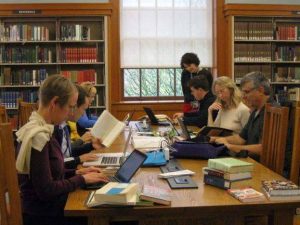
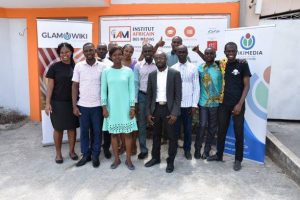
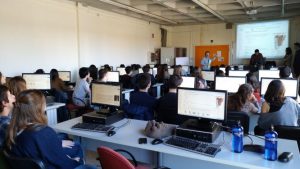
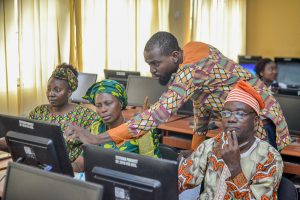
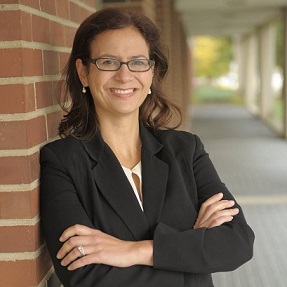 ight Librarian, University of Illinois.
ight Librarian, University of Illinois. se Nicholson, BA HDip Libr (UNISA); LLM (WITS) Scholarly Communications Librarian, University of the Witwatersrand, Johannesburg, South Africa
se Nicholson, BA HDip Libr (UNISA); LLM (WITS) Scholarly Communications Librarian, University of the Witwatersrand, Johannesburg, South Africa